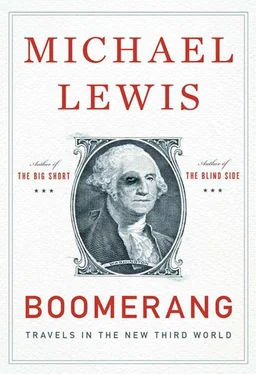Walking into the PM’s minute headquarters, I expect to be stopped and searched, or at least asked for photo identification. Instead I find a single policeman sitting behind a reception desk, feet up on the table, reading a newspaper. He glances up, bored. “I’m here to see the prime minister,” I say for the first time in my life. He’s unimpressed. Anyone here can see the prime minister. Half a dozen people will tell me that one of the reasons Icelanders thought they would be taken seriously as global financiers is that all Icelanders feel important. One reason they all feel important is that they all can go see the prime minister anytime they like.
What the prime minister might say to the Icelanders about their collapse is an open question. There’s a charming lack of financial experience in Icelandic financial-policymaking circles. The minister for business affairs is a philosopher. The finance minister is a veterinarian. The Central Bank governor is a poet. Haarde, though, is a trained economist—just not a very good one. The economics department at the University of Iceland has him pegged as a B-minus student. As a group, the Independence Party’s leaders have a reputation for not knowing much about finance and for refusing to avail themselves of experts who do. An Icelandic professor at the London School of Economics named Jon Danielsson, who specializes in financial panics, has had his offer to help spurned; so have several well-known financial economists at the University of Iceland. Even the advice of really smart Central Bankers from seriously big countries went ignored. It’s not hard to see why the Independence Party and its prime minister fail to appeal to Icelandic women: they are the guy driving his family around in search of some familiar landmark and refusing, over his wife’s complaints, to stop and ask directions.
“Why are you interested in Iceland?” he asks, as he strides into the room with the force and authority of the leader of a much larger nation. And it’s a good question.
As it turns out, he’s not actually stupid, but political leaders seldom are, no matter how much the people who elected them insist that it must be so. He does indeed say things that could not possibly be true, but they are only the sorts of fibs that prime ministers are hired to tell. He claims that the krona is once again an essentially stable currency, for instance, when the truth is it doesn’t trade in international markets. The krona is simply assigned an arbitrary value by the government for select purposes. Icelanders abroad have already figured out not to use their Visa cards, for fear of being charged the real exchange rate, whatever that might be.
The prime minister would like me to believe that he saw Iceland’s financial crisis taking shape but could do little about it. (“We could not say publicly our fears about the banks, because you create the very thing you are seeking to avoid: a panic.”) By implication it was not politicians like him but financiers who were to blame. On some level the people agree: the guy who ran the Baugur investment group had snowballs chucked at him as he dashed from the 101 Hotel to his limo; the guy who ran Kaupthing Bank turned up at the National Theatre and, as he took his seat, was booed. But, for the most part, the big shots have fled Iceland for London, or are lying low, leaving the poor prime minister to shoulder the blame and face the angry demonstrators, led by folksinging activist Hördur Torfason, who assemble every weekend outside Parliament.
Haarde has his story, and he’s sticking to it: foreigners entrusted their capital to Iceland, and Iceland put it to good use, but then, on September 15, 2008, Lehman Brothers failed and foreigners panicked and demanded their capital back. Iceland was ruined not by its own recklessness but by a global tsunami. The problem with this story is that it fails to explain why the tsunami struck Iceland, as opposed to, say, Tonga.
But I didn’t come to Iceland to argue. I came to understand. “There’s something I really want to ask you,” I say.
“Yes?”
“Is it true that you’ve been telling people that it’s time to stop banking and go fishing?”
A great line, I thought. Succinct, true, and to the point. But I’d heard about it thirdhand, from a New York hedge fund manager. The prime minister fixes me with a self-consciously stern gaze. “That’s a gross exaggeration,” he says.
“I thought it made sense,” I say uneasily.
“I never said that!”
Obviously, I’ve hit some kind of nerve, but which kind I cannot tell. Is he worried that to have said such a thing would make him seem a fool? Or does he still think that fishing, as a profession, is somehow less dignified than banking?
AT LENGTH, I return to the hotel to find, for the first time in four nights, no empty champagne bottles outside my neighbors’ door. The Icelandic couple whom I had envisioned as being on one last blowout have packed and gone home. For four nights I have endured their orc shrieks from the other side of the hotel wall; now all is silent. It’s possible to curl up in bed with “The Economic Theory of a Common-Property Resource: The Fishery.” One way or another, the wealth in Iceland comes from the fish, and if you want to understand what Icelanders did with their money you had better understand how they came into it in the first place.
The brilliant paper was written back in 1954 by H. Scott Gordon, an Indiana University economist. It describes the plight of the fisherman—and seeks to explain “why fishermen are not wealthy, despite the fact that fishery resources of the sea are the richest and most indestructible available to man.” The problem is that, because the fish are everybody’s property, they are nobody’s property. Anyone can catch as many fish as he likes, so people fish right up to the point where fishing becomes unprofitable—for everybody. “There is in the spirit of every fisherman the hope of the ‘lucky catch,’” wrote Gordon. “As those who know fishermen well have often testified, they are gamblers and incurably optimistic.”
Fishermen, in other words, are a lot like American investment bankers. Their overconfidence leads them to impoverish not just themselves but also their fishing grounds. Simply limiting the number of fish caught won’t solve the problem; it will just heighten the competition for the fish and drive down profits. The goal isn’t to get fishermen to overspend on more nets or bigger boats. The goal is to catch the maximum number of fish with minimum effort. To attain it, you need government intervention.
This insight is what led Iceland to go from being one of the poorest countries in Europe circa 1900 to being one of the richest circa 2000. Iceland’s big change began in the early 1970s, after a couple of years when the fish catch was terrible. The best fishermen returned for a second year in a row without their usual haul of cod and haddock, so the Icelandic government took radical action: they privatized the fish. Each fisherman was assigned a quota, based roughly on his historical catches. If you were a big-time Icelandic fisherman you got this piece of paper that entitled you to, say, 1 percent of the total catch allowed to be pulled from Iceland’s waters that season. Before each season the scientists at the Marine Research Institute would determine the total number of cod or haddock that could be caught without damaging the long-term health of the fish population; from year to year, the numbers of fish you could catch changed. But your percentage of the annual haul was fixed, and this piece of paper entitled you to it in perpetuity.
Even better, if you didn’t want to fish you could sell your quota to someone who did. The quotas thus drifted into the hands of the people to whom they were of the greatest value, the best fishermen, who could extract the fish from the sea with maximum efficiency. You could also take your quota to the bank and borrow against it, and the bank had no trouble assigning a dollar value to your share of the cod pulled, without competition, from the richest cod-fishing grounds on earth. The fish had not only been privatized, they had been securitized.
Читать дальше












